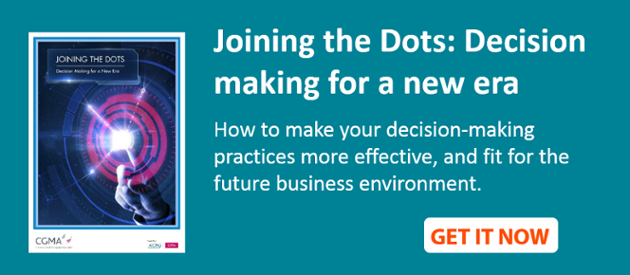In today’s business world, making sound strategic decisions is increasingly difficult, not least because of the current VUCA - volatility, uncertainty, complexity and ambiguity. Traditional decision-making frameworks can no longer provide the levels of effectiveness and responsiveness organisations need. What can business leaders do to make quicker, better strategic decisions?
CIMA and AICPA recently commissioned a survey of 300 C-suite executives from 16 countries around the world to find the answers. The findings are reported in the “Joining the Dots – Decision making for a new era.” They were also presented by Rick Yvanovich FCMA, CGMA, Past Chairman of the CIMA South East Asia Regional Board and Founder & CEO of TRG International at a seminar jointly organised by CIMA and the Vietnam Association of Accountants & Auditors.
Improvements in these 5 key areas will have a significant impact on organisations’ ability to make better strategic decisions.

1. Fighting bureaucracy
Today’s highly dynamic markets require businesses to be more agile and decisive. Unfortunately, many of them have been plagued by excessive bureaucracy. Siloed information and overly complex processes make fast, effective decisions almost impossible. 72% of surveyed companies have had at least one strategic initiative fail in the last three years due to delayed decisions.
While business leaders are well aware of the problem, they are struggling to understand the causes and to come up with sustained improvements. There are important challenges that need to be addressed such as delivering timely information and investing in data analytics tools.
2. Improving internal trust
There are genuine concerns about the levels of internal trust and collaboration, both between managers and employees and among managers. 43% of managers said there is a need for improved trust with their peers. Similarly, 65% of the workforce believe the levels of trust between business leaders and their employees need improvements.
Trust is crucial to breaking down silos and facilitating the flows of information within one organisation. Today’s complex environment dictates that decisions should not be made by one person only. Effective decision making requires the participation of people with distinctive experiences and capabilities from different functions.
It is, however, not easy for employees at lower levels in the hierarchy to have their voices heard in the decision-making processes. And there are both cultural and structural aspects in the solutions.
Organisations should strive for the levels of openness and transparency that encourage employee engagement and 2-way communication between the senior executives and employees.
Recognising that achieving strategic goals requires high-performance multi-functional teams working together, many large organisations are consolidating their core functions – finance, HR, R&D, etc. Decentralised decision making is also an approach many organisations are taking.
3. Eliminating short-termism
Almost half (48%) of the respondents said balancing their short, medium and long-term objectives is a major challenge when they make decisions. The 2008 financial meltdown is a stark reminder of how much damage internalised mindset and decisions made based on short-term gains can cause.
Many organisations since then have come to appreciate the need to take into account a wider group of external stakeholders when making strategic decisions. 45% of respondents consider this highly important.
Poorly aligned incentive structures are preventing organisations from generating for the medium and long term. It is critical that companies link their incentives more tightly to long-term goals.
Many organisations are also having difficulties selecting the right metrics to measure intangible assets – such as brand values, intellectual properties, data, and human capital. Intangible assets now make up more than 80% of S&P 500 market value, according to a study by Ocean Tomo.
4. Turning data into insight
The amount of data that decision makers can tap into today is larger than ever before and growing quickly. The challenge is to filter the noise out of the data. Business leaders need access to timely, relevant information and the ability to turn it into meaningful insight.
In reality, many organisations are suffering from information overload. Only 32% of respondents say their organisations can ensure decision makers are provided with timely and relevant information.
Taking information out of its context creates more white noise and can actually do harm. Senior executives at the headquarters of global corporations, for instance, can focus too much on global KPIs which might not be relevant to local markets.
Data analytics, therefore, has increasingly become an integral part of organisations’ strategic decision-making processes. Investment in data analytics capabilities, however, is just one step among many others. Organisations have to know how to disseminate actionable insight and put it into the hand of decision makers at all levels.
5. Investing in decision-making skills
Senior executives can no longer rely only on their gut feelings to make key decisions. Specific skill sets need to be developed. Many business leaders in the survey admitted that they are not as good at making decisions as they want to be.
Only 27% and 28% of surveyed business leaders said they are highly effective at applying new data tools and learning from outcomes, respectively. Improving decision-making skills must now be a priority.
There are a number of measures organisations can take. Specific learning and review processes should be introduced. Executives should be armed with skills like data analysis. Senior decision makers need to be more open to input and challenge in order to better learn from outcomes.
Conclusion: Integrated thinking
There is a group of organisations whose decision-making capability is head and shoulder above the others’. They are capable of making high-quality decisions that drive business performance and create a stimulating for talented people. The decision-making foundation of such organisations is called “Integrated Thinking.”
Integrated Thinking – “Joining the dots” - is built upon 4 key principles: Influence, Relevance, Analysis and Trust. Influential insight breaks down bureaucratic silos. Relevant information is made available to decision makers in a timely manner. Trust promotes transparency and accountability. And analysis helps connect strategies to business models.
 English
English  Vietnamese
Vietnamese 


